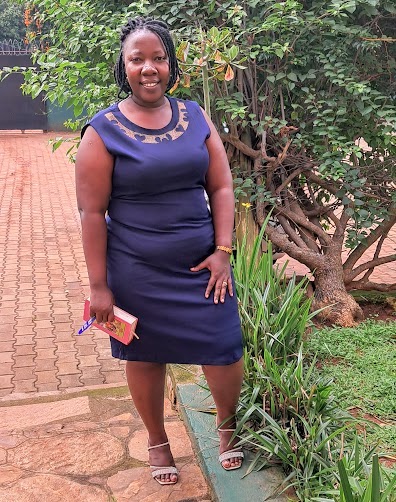Born in Kayunga district, Uganda • Birth year 1986 • Studied Mathematics and Physics (B.Sc. with Education) at Makerere University in Kampala, Uganda • Highest Degree Ph.D. in Mathematics • Lives in Kampala, Uganda • Occupation Lecturer at Makerere University
Currently, I am a lecturer in the Department of Mathematics at Makerere University in Kampala, Uganda. It is so exciting that today I consider myself one of Uganda’s most successful women in mathematics. At my primary level, I used to struggle with mathematics but was always intrigued by the challenges it would cause me to think about. I finished my primary level with mathematics as my worst subject. My secondary education was a turnaround. I would struggle with math until one time we had a change of teacher and he gave the first test. I got a 20%, and in the second test a 40% and after that my performance drastically improved and my passion for the subject grew so that it became my best subject. My math teacher encouraged me a lot. I had to redefine my friends to have those with similar interests. I would discuss this with my peers irrespective of gender. The reading of mathematics became easier.
Regarding the negative image that mathematics was for men: I guess I refused to believe that. I saw it as a challenge that had to be solved.
After my O’ level, resources were scarce in that my parents couldn’t afford my education at the kind of schools with equipped laboratories to enable me to continue pursuing my math/science career. But they were so determined to see me excel. My mom would always encourage me not to lose hope. At that time, I belonged to a supported program of Compassion International. That is where my help came from at the moment. God used Compassion to fully provide my sponsorship throughout A’ level. Of my A ‘level subjects, mathematics still seemed easy and would still be my best. Of course, I had support from my teachers who always encouraged me. Regarding the negative image that mathematics was for men: I guess I refused to believe that. I saw it as a challenge that had to be solved. I spent most of my time with the boys. Thank God they were quite helpful. When they noted I wasn’t going away, they knew we had to work together. When I completed my Uganda advanced certificate, I was given a Bachelor of Science degree with education (mathematics, physics). To be honest, I had never dreamt of being a teacher. I wanted to do Telcom engineering. My grades couldn’t push me there. Today I am grateful that my passion and desire for mathematics never came to an end. I decided to do my best to get good grades during my Bachelor’s degree. This opened more doors for me.
(…) I decided on mathematical epidemiology. I have seen so much of its application with endemic diseases and the consistent outbreaks of new viral diseases, especially in my country.
Later I joined the African Institute for Mathematical Sciences, which provided a platform for me to see how I could use mathematics. I have always loved the application of mathematics. It is not surprising that when I decided to choose the direction for my career, I decided on mathematical epidemiology. I have seen so much of its application with endemic diseases and the consistent outbreaks of new viral diseases, especially in my country. After my Ph.D. which I completed in my home country, I felt equipped to be part of the solution to our health sector. Yes, I am still growing in my career and every day I notice my effort in changing the lives of my people and Africa as a whole.
The limited resources never stopped me from pursuing my dream – instead, I would utilize whatever opportunity I could get to excel.
Being a mathematician has changed my status; by this, I cannot consider myself poor or financially disadvantaged, I have gained respect even among my peers just because I chose mathematics up to the highest academic qualification. As a mentor on several forums, I have got a number of young people who look up to me as their role model, something I lacked as I pursued the mathematics journey. I have inspired many to pursue the subject and STEM fields. I am an advocate for girls in STEM, and sharing my story with those young people struggling and almost giving up on mathematics is my passion. Once in a while, I do outreach programmes where I get to visit schools so that I can encourage young people that they can achieve much more as others before them have achieved. The mathematics journey is always interesting, but only those who choose not to give up can succeed. The limited resources never stopped me from pursuing my dream – instead, I would utilize whatever opportunity I could get to excel. The change of attitude and not dwelling on negativity from those around me enabled me to excel.

